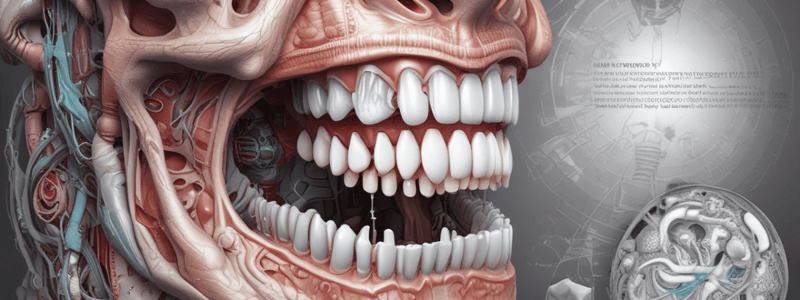Podcast
Questions and Answers
What is characteristic of the morphogenic stage?
What is characteristic of the morphogenic stage?
- Presence of Tomes' Process
- Enamel protein synthesis
- Development of junctional complexes
- Cells are short and columnar with large oval nuclei (correct)
What happens to the basal lamina after the deposition of predentin?
What happens to the basal lamina after the deposition of predentin?
- It disappears
- It disintegrates (correct)
- It remains intact
- It thickens
What occurs in the secretory stage?
What occurs in the secretory stage?
- Morphogenic stage initiation
- Synthesis of enamel proteins and secretion (correct)
- Development of Tomes' Process
- Organizing and inductive processes
What is unique about the Golgi apparatus and centrioles in the morphogenic stage?
What is unique about the Golgi apparatus and centrioles in the morphogenic stage?
What is the primary function of Tomes' Process?
What is the primary function of Tomes' Process?
What occurs during the organizing/inductive stage?
What occurs during the organizing/inductive stage?
Where is the secretion of enamel matrix confined to in Tomes' Process?
Where is the secretion of enamel matrix confined to in Tomes' Process?
What is characteristic of the maturative stage?
What is characteristic of the maturative stage?
What occurs after the formation of most of the thickness of enamel matrix in the occlusal/incisal region?
What occurs after the formation of most of the thickness of enamel matrix in the occlusal/incisal region?
What is the function of the Reduced Enamel Epithelium (REE)?
What is the function of the Reduced Enamel Epithelium (REE)?
What is the characteristic feature of the Maturative Stage?
What is the characteristic feature of the Maturative Stage?
What is the outcome of premature degeneration of REE?
What is the outcome of premature degeneration of REE?
What percentage of amelogenesis time is occupied by the Maturative Stage?
What percentage of amelogenesis time is occupied by the Maturative Stage?
What is the characteristic of the junctions between ameloblasts in the proximal region during the Maturative Stage?
What is the characteristic of the junctions between ameloblasts in the proximal region during the Maturative Stage?
What is the main function of ameloblasts during the Maturative Stage?
What is the main function of ameloblasts during the Maturative Stage?
What stage does the tooth development reach when the enamel is completely developed and fully calcified?
What stage does the tooth development reach when the enamel is completely developed and fully calcified?
During which stage of the life cycle of ameloblasts are they involved in the organization of the dental papilla?
During which stage of the life cycle of ameloblasts are they involved in the organization of the dental papilla?
What percentage of the enamel is mineralized during the secretory phase?
What percentage of the enamel is mineralized during the secretory phase?
What is the primary function of proteases secreted by ameloblasts during the maturative stage?
What is the primary function of proteases secreted by ameloblasts during the maturative stage?
During which stage of amelogenesis do ameloblasts secrete enamel matrix proteins to form an organic matrix?
During which stage of amelogenesis do ameloblasts secrete enamel matrix proteins to form an organic matrix?
What is the percentage of water in the enamel during the secretory phase?
What is the percentage of water in the enamel during the secretory phase?
What happens to the enamel crystallites during the maturative stage?
What happens to the enamel crystallites during the maturative stage?
During which stage of the life cycle of ameloblasts do they start to synthesize and secrete enamel matrix proteins?
During which stage of the life cycle of ameloblasts do they start to synthesize and secrete enamel matrix proteins?
What is the percentage of protein in the enamel during the maturative phase?
What is the percentage of protein in the enamel during the maturative phase?
Flashcards are hidden until you start studying
Study Notes
Morphogenic Stage
- Early bell stage: Low cuboidal cells rest on basement membrane, separating it from dental papilla.
- Cells are short and columnar with large oval nuclei, Golgi apparatus, and centrioles located in the proximal end of the cell.
- Mitochondria are evenly distributed throughout the cytoplasm.
Organizing/Inductive Stage
- Late bell stage: Ameloblasts elongate up to 40 microns, resting on basement membrane, separating it from newly formed odontoblasts.
- Nuclei cluster in the proximal region, with few scattered mitochondria, and increased in number and size of rER.
- Golgi complex increases in volume and migrates towards the central core of the cytoplasm.
Secretory Stage
- Basal lamina supporting ameloblasts disintegrates after deposition of predentin.
- Development of junctional complexes, proximal terminal web, and distal terminal web.
- Ameloblasts synthesize enamel proteins and secrete them, starting amelogenesis.
- Structureless layer of enamel is deposited, and ameloblasts migrate away from the dentin surface, permitting formation of Tomes' Process.
- Tomes' Process contains secretory granules and small vesicles, secreting enamel confined to two sites.
Maturative Stage
- Enamel maturation occurs after most of the thickness of the enamel matrix is formed in the occlusal/incisal region.
- Two-thirds of amelogenesis time is occupied by the maturation stage.
- Cyclic process involves modulation of cells, creation, loss, and recreation of 'ruffle-ended' and 'smooth-ended' ameloblasts.
- Ruffle-ended ameloblasts have leaky proximal junctions and tight distal junctions, while smooth-ended ameloblasts have tight proximal junctions and leaky distal junctions.
- Induction of inorganic material and removal of proteins and water occur.
Protective Stage
- When enamel is completely developed and fully calcified, ameloblasts cease to be arranged in a well-defined layer.
- The cell layers form a stratified epithelial covering of enamel, called reduced enamel epithelium (REE).
- The function of REE is to protect mature enamel by separating it from connective tissue until the tooth erupts.
Desmolytic Stage
- REE proliferates, inducing atrophy of connective tissue separating it from oral epithelium, and fusion of two epithelia can occur.
- Epithelial cells elaborate enzymes that destroy connective tissue fibers by desmolysis.
- Premature degeneration of REE may prevent the eruption of the tooth.
Life Cycle of Ameloblasts
- According to function, the life span of cells of the inner enamel epithelium is divided into six stages: morphogenic, organizing/inductive, secretory, maturative, protective, and desmolytic.
- The life cycle of ameloblasts involves differentiation, growth, and maturation of enamel.
Studying That Suits You
Use AI to generate personalized quizzes and flashcards to suit your learning preferences.




